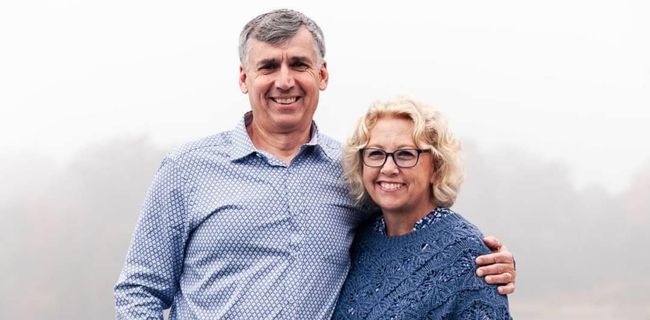In the fall of 1991, I failed in my first attempt to be a cooperative manager. While I sat dejected at the kitchen table after a 500-mile drive home, Mary, my wife, told me that she could feel that it wasn’t over. Sure enough, the first choice turned the job down, and I got the offer two days later. Her intuition was spot on. With her by my side, I have been managing electric cooperatives ever since for almost 32 years now.
With retirement looming in June, this is my last Valentine’s Day opportunity to thank my best friend and the last girl I ever took to the prom for decades of support. It is hard to focus at work if things are not good at home. I have managed three cooperatives that fired the manager before me. In the early years of each, my home life was my sanctuary. I could find calm and peace and always had one great friend to listen about my day. While work was hard, I could concentrate because I knew she had the home front duties locked down.
In Wyoming, office phones were diverted to our house after work. When the phone rang at night, we never knew what we would get—an outage, a billing problem, or an angry member. (It was Wyoming, so there were never any tree complaints!) She often took the calls and relayed the messages. She was never on the payroll but always on the job.
In those early days of no cell phones, I carried a mobile radio that scanned the fire department, ambulance service, and the electric cooperative frequencies. Mary put up with my service to all three. I often left her and the kids in the middle of a meal and more than one ball game in the yard. One time, I literally left her in the middle of pushing a stroller across town when a friend in an RV flagged me down with a medical emergency inside. So many late nights, I crawled into bed and woke her up for a kiss and a recap of the latest event.
Twenty years ago, she agreed to move with me “one last time” to Cherryland. I dove into the community and the rebuilding of the co-op. Ambulance calls and fires were traded for at-home distractions caused by cell phones and emails. She has also endured being introduced as “Mrs. Tony Anderson” at hundreds of community functions over our time here. Each time, she patiently stood by my side as I chatted continuously about work and community issues.
When I left her at home for a meeting or trip, I always laughingly told her that she would have all of me whenever I got back. With an eye roll and a knowing glance, she knew she would never have all of me. I am forever thankful that she was happy with what was left of me after a long day, a bad call, or one more community commitment.
I have many things to be thankful for near the end of a great journey. None are more significant than her. I have loved this woman since our first high school dance in 1980. Today, when I kiss her goodbye, I tell her one thing: “I will come home to you.” Coming home to her is all I want to do for the rest of my life.



Tony… that touched me deeply. You are an amazing man and an inspiration!
Thank you – I choose “lucky” over “amazing” …….
Wonderful tribute to your wife! Thank you for sharing. Enjoy retirement!!
Wishing a marvelous retirement! Thank you for your service over the years and now enjoy being full time with your lovely bride.
Well said. As a former State of Michigan employee and part time Paid On-Call firefighter/EMT I learned to appreciate my wife’s grace and patience putting up with 29-1/2 years of interrupted family plans, abrupt night time tone-outs, taking two vehicles grocery shopping (just in case). Kudos to your wife and congrats on your impending retirement!
This brought tears. What a great tribute to both of you.
A very touching article, Tony. I wish you and Mary a lovely retirement!
Oh my gosh, what a sweet love letter and tribute to your wife, Mary! Both of you are so fortunate to have each other. Thank you both for what you’ve done at Cherryland, and enjoy every moment of retirement!
Lovely ❤️! Happy retirement with your lovely bride! Thank
You for all of your hard work with Cherryland Electric. You have been with them “almost” as long as my husband and I have. 😊
Humility and vulnerability make for great leadership and perhaps in this case, your long and appreciated tenure serving all of us through Cherryland. You will be missed
Well said. You are blessed with a great marriage and a great career. Thank you for your all your years of service.
What a lovely and touching tribute to your wife! I will miss your leadership at our cooperative and will miss your positive and open communication to our members. Best wishes to you and your wife on your retirement.
What a beautiful love story. I feel honored to share in your story through this message. Thank you for allowing us to be a part of this journey.
That made me cry! What a beautiful story. You are both very blessed.
Thank you to you and your family.
Such a moving tribute to your wife, your best friend. It brings tears to my eyes! I join the others in thanking you for your open and honest communication and for your dedication to Cherryland. We will miss you. I’m wishing you and and your lovely wife much happy together time upon your retirement.
Congratulations on your retirement, and the beautiful tribute!
Although Jim never worked under you, we certainly have admired you as a friend and manager. Many thanks to Mary also, as all Cherryland employees know much about interruptions of their “home tme”, and how many times their lives were disrupted and their spouses carried on. You both deserve a long retirement together. Thank you Tony and Mary
Well stated. God speed in your next chapter on your life journey with your “best friend”.
Such a beautiful tribute to your wife. Thank you for your dedication and many sacrifices along the way. Happy retirement to both you and Mary!
I’ll miss your leadership, your presence in these pages and your wonderful writing, but I’m glad your wife will finally have you all to herself! “Coming home to her is all I want to do for the rest of my life,” sounds like lyrics to a beautiful love song. We wish you all the best, Tony.
Thank you for your years of service and leadership at Cherryland Electric. We have felt in good hands with you at the wheel. Your marathons and involvement with Big Brothers to heighten awareness for the needs of these kids also speaks of your character.
Few people understand the team effort it takes when one spouse has a job in service to the public. Few realize the efforts of the behind the scenes spouse or family members who step in and help where there is a need. Thom’s journey was much like yours and Mary’s much like mine. Many events that take you away from home, late night calls, the never fail emergency situation as you sit down to holiday dinners, leaving in the middle of guest over. We are glad you will have some uninterrupted time at home and availability to do things together. How thoughtful of you to express publically this tribute to Mary.
I will miss your monthly newsletters. You are a great communicator to all of us. Maybe you can take this gift and use it on your next journey.
Awesome !
Few people have a loyal relationship like you and Mary. Even fewer understand the team effort it takes when one of the partners has a job that is serving the public. Thom and I have lived a journey like this and know what a team effort this has to be to be successful on both fronts. Thom’s journey is much like yours and Mary’s journey is .much like mine. What a wonderful tribute to the behind the scenes partner(s)t is also a family effort,: interruptions during holiday gathering, leaving in the middle of guest in the home, late night calls, etc. Much support from family stepping in when needed.
Thank you for your service at Cerryland Electric. We knew we were/ are in good hands. I for one have looked forward to your monthly newsletters at the start of each publication from Cherryland Electric and I will miss them. Your service to Big Brother and your marathons to raise awareness speak again of your character. You are a great writer and communicator to all of us. Hopefully at home too 😃. Perhaps you will take this gift and use it in your next journey.
What a very touching tribute to Mary, Tony! You are both fortunate to have each other! Happy Valentine’s Day, and happy eventual retirement. You will be missed at Cherryland.
Tony what a wonderful tribute to Mary,knew both of you as young people,watched you both grow up to be fine young people. Enjoy your retirement,.
Great to hear from you. Hope you and Ed are doing well. Lots of good Boy Scout memories that involve Ed. “Those were the days” All the best – Tony
I remember the day you interviewed for the Cherryland GM job. One of the most impressive interviews I’ve ever experienced. With expectations set high, you exceeded them by miles, with dignity, grace and a deep reservoir of grit.
It’s not only what you’ve accomplished – it’s also how you accomplished things. You are leaving a legacy that we can all be proud.
After reading this touching memorial, I now realize Mary gets all the credit!!! (just kidding – you guys are a dynamo team!)
Thank you. Coming from someone who was inside the start of my time here, it means a lot. I was fortunate to have you on the board in the beginning. All the best to you and yours.
Tony, I always felt you were very special. When you and Mike played with Johnny West you were always so kind and Mike had so much fun.
Thank you for your beautiful tribute to Mary.
Thank you. Those we good days and simpler times. I always enjoyed my time with Mike.